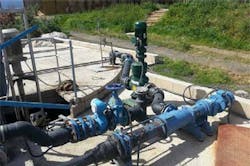Protecting PC Pumps in Spanish Biogas Plant
Anaerobic digestion offers an efficient, cost-effective process for green energy development while also providing a sustainable solution for the disposal of animal byproducts. In a typical biogas processing operation, manure, wastewater solids, agricultural residues and food scraps are delivered to a digester system. The process uses microbes to break down the organic material through a fermentation process under controlled conditions, resulting in clean biogas and digested material. That digested material is then used to make fertilizer, compost, soil amendments or animal bedding. The raw biogas is further processed, and water, carbon dioxide and other trace compounds are removed, leaving mostly methane and other trace gases. The processed biogas is then distributed and used for producing electricity, heat and fuel, or injected into natural gas pipelines. Biogas provides a clean, repeatable source for energy and fuel while also making use of organic materials that might otherwise end up in a landfill.
Organic feedstock also comprises tough, large pieces of inorganic debris, such as metals and plastics. This material, if left uninhibited, can clog the pumps and pipelines within the digester and cause the system to break down. Operators have to dismantle the pumps and build them back together – a time-consuming and costly process. In 2013, a biogas application facility in Catalonia, Spain, was experiencing these very problems. They worked with Protech Continental, the exclusive JWC Intl. distributor in Spain, to devise a long-term solution that would keep the system running smoothly.
The biogas facility relies on feedstock from local industrial (dewatered sludge) and agricultural (manure and slurry) sources to produce biogas, which they then use to generate electrical power. In the process, the dewatered sludge is fed into the system along with the slurry and cow manure, typically with 8-12 percent dry solids (DS) – a typical feedstock combination in the Spanish biogas market. Dewatered sludge at 25% DS is mixed with quantities of manure at 5% to 8% DS to give a resulting mixture of around 13% DS, which can be pumped and still has a high organic content, rather than diluting or watering the thick sludge down.
The liquid manure is used to dilute the dewatered sludge to reduce the viscosity to around 3,000 to 5,000 cPs (3,000 to 5,000 mPa·s), which is similar in viscosity to syrup or molasses. This ensures it is easily pumped and still able to sustain the process without diluting the organic content available for digestion.
The Solution
The customer found that the imported loads included many inorganic problem solids, including metal pieces, plastics, tools and ropes, which caused significant problems for the inline chopper pump. Eventually, the chopper pump was replaced with a progressive cavity pump supplied by Protech.
The pump performed well, sucking the slurry up and out of the mixing tank and into the process. However, the tough inorganic solids eventually caused wear and weekly maintenance issues, resulting in the first stator replacement after just six months of operation. Protech worked with the engineers on a more durable, reliable solution for the tough waste and suggested an inline Muffin Monster. The dual cutter stacks are equipped with sharp, stainless steel teeth – ideal for slicing through incredibly tough debris.
The Results
Since incorporating the Muffin Monster, the system has not experienced any downtime due to material clogging, and the maintenance crew was able to wait 19 months to replace the stator.
By installing the PC pump with the Muffin Monster for protection, the customer gained operational hours due to reduced maintenance, spare parts savings and reduced downtime and failures in the plant. The addition of the grinder is the only upgrade/addition to the facility since it was built, and the grinder has extended the stator repair interval, offering savings of approximately €500 ($546.62) per stator change and has further increased the maintenance and repair intervals to keep the plant operating at peak performance.
